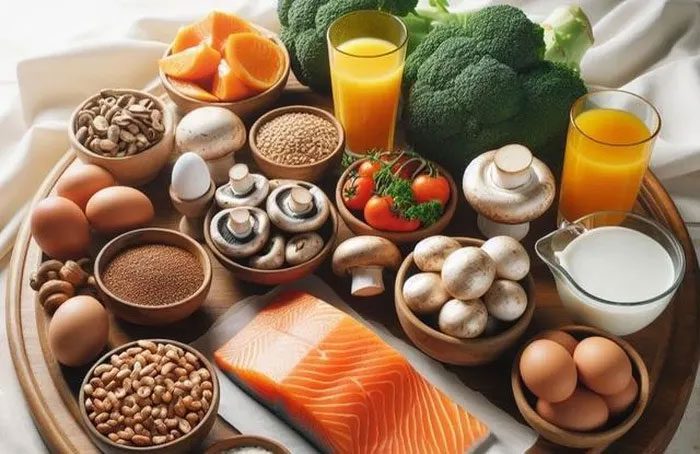A group of authors from leading research institutions in the United States and Denmark has achieved surprising results in a study related to gastrointestinal cancer.
Researchers from the Francis Crick Institute, the National Cancer Institute (NCI) under the National Institutes of Health (NIH) in the U.S., and Aalborg University in Denmark discovered that a diet rich in vitamin D may enhance immunity against certain types of cancer.
According to a paper published in the journal Science, this finding was demonstrated by a direct experiment on mice and an analysis based on data from 1.5 million Danish citizens.

Foods rich in vitamin D may help boost cancer immunity – (AI graphic).
In the first experiment, it was found that mice on a vitamin D-rich diet seemed to have better immunity when implanted with gastrointestinal tumors.
The researchers analyzed the intestines of these mice and found that vitamin D affected the epithelial cells in the intestines, subsequently increasing the number of Bacteroides fragilis bacteria.
This type of bacteria helps mice have better immunity against cancer, as the implanted tumors did not grow as much.
To confirm this, the researchers fed the mice a regular diet supplemented directly with Bacteroides fragilis, which provided similar cancer immunity benefits.
Additionally, the authors conducted two analyses on data from 1.5 million Danes and identified two key points.
- First, those with lower daily vitamin D intake had a higher risk of cancer.
- Second, among cancer patients, those with higher levels of vitamin D were more likely to respond well to immunotherapy treatments.
These results align with previous studies conducted by other research groups.
While Bacteroides fragilis is also found in the human microbiome, the authors suggest that more research is needed to understand whether vitamin D helps enhance cancer immunity in humans through this pathway, or if there are other contributing mechanisms.
Nevertheless, the aforementioned evidence is sufficient to indicate that consuming adequate vitamin D may help reduce the risk of gastrointestinal cancer to some extent. Moreover, vitamin D is also a vital nutrient needed for many other organ systems, such as the musculoskeletal and nervous systems.
According to Healthline, vitamin D can be easily found in many delicious and nutritious foods.
First are fatty fish such as salmon, mackerel, tuna, and sardines. Among these, salmon is the richest in vitamin D, containing 2.5 to 5 times more than the others, with wild salmon having higher levels than farmed salmon.
Next, vitamin D is abundant in mushrooms, egg yolks, cow’s milk, beef liver, cod liver oil, shrimp, and various seeds. Some dark green vegetables, salty fruits, avocados, and bananas also contain relatively good amounts of vitamin D.
Additionally, you can supplement vitamin D in pharmaceutical form. It is advisable to consult a doctor when considering this option.



















































